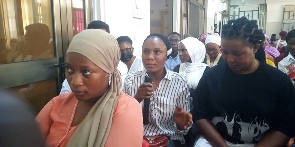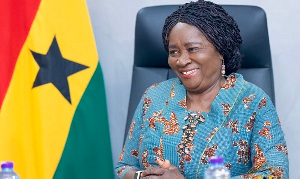Civil Society Organizations in Gender Equality and Social Inclusion are worried perpetrators are still emboldened to get away with gender-Based Violence in the Offinso Municipality as women who report issues of abuse become targets of stigma.
An engagement on Gender-Based Violence in the Offinso Municipality revealed that the Social Welfare Department had received only one official complaint of gender-based violence from January to December 2022.
“If you report an abuse you are seen as a bad person. Because of the societal tag and the stigma, nobody wants to talk about gender-based violence and even child abuse. In 2022, we have only one child abuse case that a circuit supervisor reported to us.” Municipal Social Welfare Officer Edith Precious Lumorvi pointed out.
The sensitization formed part of the efforts of the GrEEn Project of the SOS Villages to transform social norms that shield perpetrators of violence against women.
Through Dramas; the GREEN Project of the SOS Village painted the picture of the dangers of condoning gender-based violence heavily skewed towards women.
The dramas which were followed by a participatory discussion and seminar are supposed to empower women to speak up when sexually, emotionally, financially and physically abused.
Toll-free numbers and other free avenues for reporting for proper legal redress were further issued for community members to refrain from sitting on the fence when they come across acts of domestic violence.
Training Team Lead Vincent Ohene Ntow was positively embarking on such community participatory seminars coupled with the economic empowerment programs targeted at the residents would spell a game change in GBV issues in the country.
“Stigma is one major issue that prevents people from reporting issues of gender-based violence but again if people, especially women, have decent sources of livelihoods they are able to provide their basic needs. The fact that they don’t have to rely on a man will deter such men from abusing them at will,” he noted.
Admissions by participants suggested that while Muslim-dominated communities found it inappropriate to report such matters to law enforcement authorities, ignorance was accentuating the situation.
Abdul Karim, an Islamic cleric in Offinso told Ultimate News Domestic Violence remained with religious leaders and is not a matter for the police, the social welfare department nor any other body of the state; not even when it is criminal.
“It is entirely wrong for domestic matters of the home and the family to become a police case. They are treated as secrets. Even if a husband assaults and maims a wife, the Imam can remedy it by asking that the man caters for every medical bill and compensation to the wife,” he explained.
Some women from the Zango communities were worst affected by Gender Based Violence, however, gave some glimmer of hope, pledging, to challenge the status quo by training their young to be law-abiding and socially responsible adults.
“What we have learnt here will help us in the training of our children. At least if we give them the right training, it will stay with them as they become adults,” Alimatu Sadia told reporter Ivan Heathcote – Fumador.
The GrEEn Project funded by the European Union Emergency Trust Fund for Africa (EUTF), The United Nations Capital Development Fund, the Embassy of the Kingdom of the Netherlands, SNV operates in the Ashanti and Western Regions to create Green jobs while promoting gender equity and empowering women, youth and returnees.
Beneficiaries are directly employed under EU-funded climate-resilient infrastructure in projects and trained to use proceeds to establish environmentally sustainable ventures.
The project’s first phase directly engaged 381 persons comprising 124 males and 257 females.
Phase 2 of the project exponentially increased the number of women as it engaged 616 females out of 838 beneficiaries.
Regional News of Friday, 23 December 2022
Source: Ivan Heathcote - Fumador, Contributor













